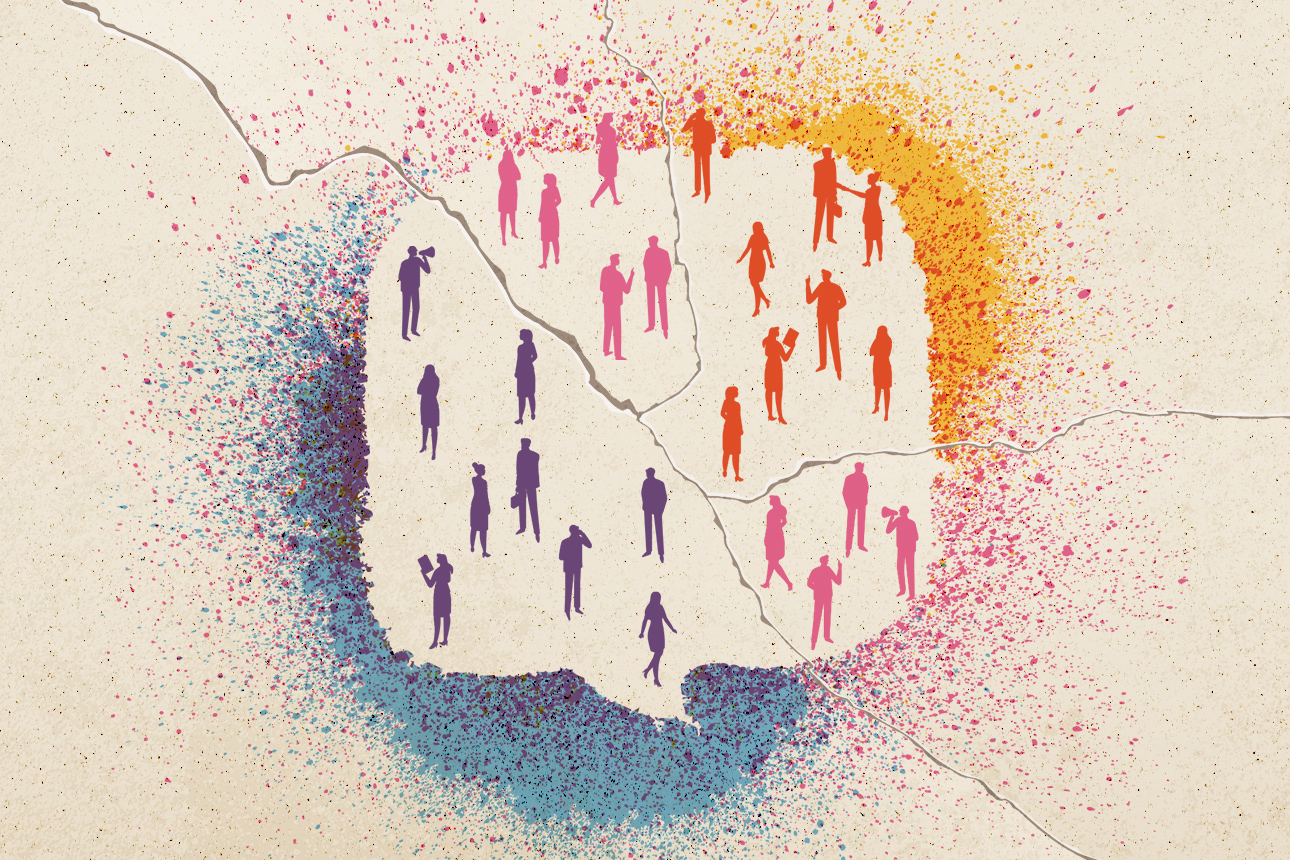Business Leaders Need to Rise Above Anti-Woke Attacks
Leaders must tackle inequities head-on, dispelling “woke” fears to create just, diverse, and thriving workplaces.
Topics

Carolyn Geason-Beissel/MIT SMR | Getty Images
As the debate over the word woke rages on, business leaders are grappling with the meaning and connotations of the term. (Spoiler alert: Woke means being aware of inequity and injustice.) Many conservative CEOs have followed the lead of politicians in using the label as a weapon, accusing others of contracting the “woke mind virus” or claiming that caring about “woke diversity” ignores the economy’s bottom line. But even politically moderate CEOs have become quick to reject the label.
Consider Larry Fink, CEO of the multinational investment firm BlackRock, who has led the charge of investing with environmental, social, and governance (ESG) goals in mind. In his annual letter to fellow chief executives in 2018, Fink asked, “What role do we play in the community? How are we managing our impact on the environment? Are we working to create a diverse workforce?” BlackRock has continually led the charge in making ESG a mainstream pillar of investing. Those efforts seem socially aware. Still, Fink claimed that those initiatives are “not woke.”
Get Updates on Transformative Leadership
Evidence-based resources that can help you lead your team more effectively, delivered to your inbox monthly.
Please enter a valid email address
Thank you for signing up
Or take the case of JPMorgan Chase CEO Jamie Dimon. After George Floyd’s murder in the summer of 2020, Dimon personally took a knee with employees in a New York Chase branch and went on to send a memo to the company’s employees that stated, “We are committed to fighting against racism and discrimination wherever and however it exists.” But, like Fink, Dimon has gone to lengths to separate stakeholder capitalism from the woke label, despite demonstrating awareness of inequity and injustice through commitments like JPMorgan Chase’s $30 billion investment in advancing racial equity.
Why do corporate leaders hesitate to embrace the woke label when being aware of inequity and injustice aligns with growing commitments to socially conscious business? One issue is the term’s evolution. In its 21st-century usage, woke emerged as a watchword for Black Americans in the fight against police brutality and racial discrimination, but in recent years the term has been transformed into a cudgel for the conservative right to fight culture wars. Recent polling finds that Americans generally understand that woke means “being informed, educated on, and aware of social injustices,” and not “being overly politically correct.” But they are also slightly more likely to view being called woke as an insult, not a compliment.
References
1. K.W. Phillips, “How Diversity Makes Us Smarter,” Scientific American, Oct. 1, 2014, www.scientificamerican.com; and C.L. Dezsö and D.G. Ross, “Does Female Representation in Top Management Improve Firm Performance? A Panel Data Investigation,” Strategic Management Journal 33, no. 9 (September 2012): 2008-2018.
2. O. Richard, A. McMillan, K. Chadwick, et al., “Employing an Innovation Strategy in Racially Diverse Workforces: Effects on Firm Performance,” Group & Organization Management 28, no. 1 (March 2003): 107-126.
3. S.K. Horwitz and I.B. Horwitz, “The Effects of Team Diversity on Team Outcomes: A Meta-Analytic Review of Team Demography,” Journal of Management 33, no. 6 (December 2007): 987-1015.
4. J. Vredenburg, S. Kapitan, A. Spry, et al., “Brands Taking a Stand: Authentic Brand Activism or Woke Washing?” Journal of Public Policy & Marketing 39, no. 4 (October 2020): 444-460.
5. R. Douthat, “The Rise of Woke Capital,” The New York Times, Feb. 28, 2018, www.nytimes.com.
6. D. Kihara, “DeSantis Says Disney ‘Crossed the Line’ in Calling for ‘Don’t Say Gay’ Repeal,” Politico, March 29, 2022, www.politico.com; and A. Durkee, “Rejecting AP Studies, Restricting Libraries: Here’s How DeSantis And His ‘Anti-Woke’ Policies Are Impacting Florida Education,” Forbes, Jan. 20, 2023, www.forbes.com.
7. S. Oreg and Y. Berson, “Leaders’ Impact on Organizational Change: Bridging Theoretical and Methodological Chasms,” Academy of Management Annals 13, no. 1 (January 2019): 272-307.
8. K.W. Crenshaw, “Race, Reform, and Retrenchment: Transformation and Legitimation in Antidiscrimination Law,” Harvard Law Review 101, no. 7 (May 1988): 1331-1387.
9. V.C. Plaut, F.G. Garnett, L.E. Buffardi, et al., “‘What About Me?’ Perceptions of Exclusion and Whites’ Reactions to Multiculturalism,” Personality and Social Psychology 101, no. 2 (August 2011): 337-353; and D.L. Kidder, M.J. Lankau, D. Chrobot-Mason, et al., “Backlash Toward Diversity Initiatives: Examining the Impact of Diversity Program Justification, Personal and Group Outcomes,” International Journal of Conflict Management 15, no. 1 (2004): 77-102.
10. E.D. Knowles and B.S. Lowery, “Meritocracy, Self-Concerns, and Whites’ Denial of Racial Inequity,” Self and Identity 11, no. 2 (2012): 202-222.
11. L.T. Phillips and B.S. Lowery, “The Hard-Knock Life? Whites Claim Hardships in Response to Racial Inequity,” Journal of Experimental Social Psychology 61 (November 2015): 12-18.
12. K. Butler, “Big Tech Layoffs Are Hitting Diversity and Inclusion Jobs Hard,” Bloomberg, Jan. 24, 2023, www.bloomberg.com; and K. Atkinson, “Corporate Diversity Pledges Fizzle Amid Layoffs, GOP Backlash,” Bloomberg Law, March 9, 2023, www.bloomberglaw.com.
